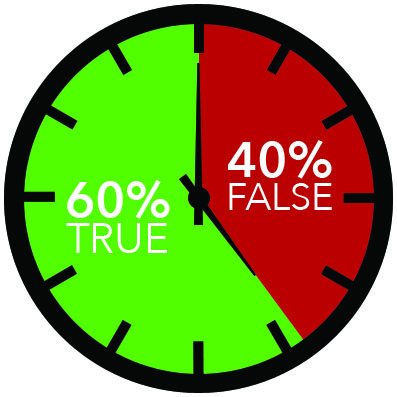Statement: A teenager under the age of 18 driving home from a school or religious event after curfew will not receive a ticket
As junior Brian Kim was driving home from a youth event at church on an August night, what he thought was an “insignificant” traffic violation had put him at risk of getting into bigger trouble.
It was 12:30 a.m. and he had just dropped off his two friends at their houses. Kim said he knew he was violating the driving curfew law, but he made sure to “drive super carefully so [he] wouldn’t get caught.”
Detective Matthew Szymanski said there are misconceptions about when curfew is and to whom it applies. Curfew laws do not only apply to Northbrook citizens, but the entire state of Illinois as well. Once a teenager turns 17, he or she no longer has a walking curfew. However, anyone under the age of 18 still has a driving curfew.
Nighttime driving restrictions for teenagers in the state of Illinois are 11:01 p.m. to 6 a.m. on Fridays and Saturdays. Teenagers under the age of 18 cannot drive from 10 p.m. to 6 a.m. from Sunday to Thursday.
“Before the police pulled me over, I was actually thinking, ‘When am I going to get my first ticket?’ and then when I saw the blue and red lights behind me, I thought ‘I’m in trouble,’” said Kim. “It was such a weird coincidence and I was surprised at how unlucky I was.”
Kim said the police had initially pulled him over because he had been driving with an expired license plate. When the police officer walked up to Kim’s window, he immediately asked how old Kim was.
According to Szymanski, a police officer is allowed to pull someone over if the officer thinks that a person looks too young to be driving after curfew, but he said that is not the situation in most cases.
“The probable cause of a stop would be a traffic violation, but if [the officer] finds that the driver is violating curfew, then that would also come into effect,” said Szymanski. “When you break driving curfew, [Illinois law] says you have no valid license.”
Although Kim had been considered an unlicensed driver with an expired license plate, Kim said the police officer had let him off with a warning.
“I explained to him that church ended at [midnight] and that I had to take my friends home,” said Kim. “It might have also helped that I was being really polite and nice and sort of sweet-talking him.”
Kim thought it had been good manners that got him off the hook, but Szymanski said there may be some leeway with the driving curfew law.
“Go straight home from the event,” said Szymanski. “Whatever it is — family, church, school sponsored type event — if they can prove [they’re going straight home] they won’t be ticketed. It’s supposed be be within a reasonable time frame.”
According to Szymanski, the way in which a traffic stop is handled is specific to each officer. Some may even call the parents of the driver to find if there is legitimacy behind the teenager’s reasoning.
“Every traffic stop for an officer is different,” said Szymanski. “I would ask: ‘Where do you live? Where were you at?’ It’s not too hard to say when you’re out of the boundaries.”
Szymanski said the consequences for violating curfew could result in a fine, traffic safety school or eligibility for supervision. The final penalty is determined by the judge when the driver goes to court.
“Teenagers don’t care if they drive after curfew because we think we’re good drivers,” said Kim. “We think we won’t get caught, but obviously I was wrong.”
A survey was conducted in order to get an idea of the student body’s thoughts on common misconceptions about the law. Each article is accompanied by poll results based on a sample size of 100 students. Note that the poll results are in response to the initial statement at the top of each article.


